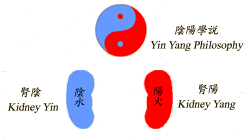TCM believes health is achieved when yin and yang are in harmony. The body's physical form belongs to yin while the body's activities or functions belong to yang. Because both the body's physical form and functions are dynamically balanced, they mutually restrict and depend on one another. Hence, in TCM disease results from either a deficiency of vital energy (qi) (diagnosed as a deficiency of yin fluid or a deficiency of yang qi) or an excess of the "pernicious evils" (excess of yin evils or yang evils). Pernicious evils are factors outside the body that cause disease. The conflict between resuming vital energy and getting rid of the "pernicious evils" is what allows the disease to either progress or transform back to a healthy state.
According to TCM theory, prostate cancer is caused by heat, stasis or deficiency problems. Heat is considered a pernicious evil. (See above for definition.) Stasis or deficiency problems, which are described below in more detail, stem from a deficiency of vital energy (qi).
Heat:
The concept of heat includes two types: "damp-heat evil" and "hyperactivity of excessive ministerial fire." Damp heat evil occurs when there is an over consumption of greasy foods and alcohol. This leads to a malfunction of the stomach and spleen and causes a build up of damp heat that flows downwards, attacks the bladder and impairs the vaporization function responsible for fluid regulation. (See definition section.) Symptoms like dribbling urine, frequent urination with or without prickling pain and periodic retention of urine can develop when this happens.
Ministerial fire is the source of heat power in the human body. In TCM, it is believed that when a man is overly sexually active, the kidney essence is consumed and the internal ministerial fire becomes excited. The excessive ministerial fire is a kind of "evil fire" which makes the body produce heat. This "evil fire" affects the lungs, bladder and triple burner and impairs the passage of body fluids. As a result, symptoms of urinary frequency and dribbling urine with prickling pain may occur.
 |
responsible for
" vaporatization
function" which is separating body fluid
into urine and into
fluid to be reused by
the body
|
provides heat for body functions known as " ministerial fire"
|
Stasis:
Stasis occurs when a particular substance cannot flow smoothly. In TCM, stasis happens when there is stagnation of qi or blood flow. The kidneys play an important part in the vaporization of body fluids. In this process, fluids are separated by the kidneys to ones that can be reused by the body or into "turbid water" which is eventually excreted as urine. When the emotion rage impairs liver function, the surrounding vital energy or qi stagnates and cannot flow properly, eventually transforming into an "evil-fire." As the "evil fire" accumulates in the lower burner, the vaporization process is affected and so is normal urination.
Qi is the commander and controller of the body's blood. Once qi flow stagnates, blood circulation will not be smooth, and this can lead to difficulty urinating and to bloody urine (haematuria).
Deficiency:
Deficiency problems refer mainly to kidney failure, which results from the damage done by the above mentioned causes of heat and stasis. In summary, sexual excess and improper diet both lead to an accumulation of damp heat and ministerial fire, which contribute to qi stagnation and blood stasis. These, in turn, eventually exhaust kidney -yin, which is the foundation supplying fluid to the entire body for moistening and nourishing purposes. Once kidney yin is completely exhausted, kidney failure will ensue.
Other Causes of Prostate Cancer:
Other factors associated with the development of prostate cancer are still under further investigation.
These include:
 |
high levels of male hormones |
 |
excessive sexual activity |
 |
gonorrhea |
 |
other causes of urinary tract infections |
 |
A chronic intake of greasy food leading to a disorder in hormone metabolism. |
|